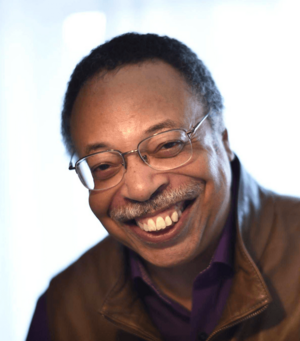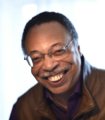George Elliott Clarke facts for kids
Quick facts for kids
George Elliott Clarke
OC ONS
|
|
|---|---|

Clarke in 2018.
|
|
| Born | February 12, 1960 Windsor, Nova Scotia, Canada
|
| Education | Queen Elizabeth High School |
| Alma mater | University of Waterloo; Dalhousie University; Queen's University |
| Occupation |
|
| Known for | Poet Laureate of Toronto (2012–2015); Canadian Parliamentary Poet Laureate (2016–2017) |
George Elliott Clarke is a famous Canadian writer, poet, and literary critic. He was born on February 12, 1960. He held important roles like the Poet Laureate of Toronto from 2012 to 2015. He also served as the Canadian Parliamentary Poet Laureate in 2016 and 2017. This means he was the official poet for the city of Toronto and later for the whole country's Parliament!
Clarke's work often talks about the history and experiences of Black Canadian communities. These communities are mainly in Nova Scotia and New Brunswick. He even created a special word, "Africadia," to describe their unique culture and geography.
Contents
Life and Education
George Elliott Clarke was born in Windsor, Nova Scotia. He grew up in Halifax. He finished high school at Queen Elizabeth High School in 1978.
He went on to study at several universities. He earned a Bachelor's degree from the University of Waterloo. He also got a Master's degree from Dalhousie University and a PhD from Queen's University. He has received many special honorary degrees from other universities too.
Clarke taught English and Canadian Studies at Duke University. He also taught at the University of Toronto. In 2003, he became the first E J Pratt Professor of Canadian Literature there. He has also been a visiting scholar at other universities, including Harvard University.
Outside of teaching, Clarke has worked as a researcher for the government. He was also an editor for student newspapers. He even worked as a social worker and a newspaper columnist.
Clarke is very involved in poetry groups. He is also a founding member of a music group called Afro-Métis Nation. Their music mixes blues, spirituals, and sounds from different cultures. The group's name shows their mixed heritage, including Africadian and Mi'kmaq roots.
Writing and Themes
George Elliott Clarke has written many books. These include seventeen collections of poetry, two novels, and four plays or operas. He has also helped edit books that feature other African-Canadian writers and poets.
His writing explores many different topics. He often includes political, historical, and cultural themes. He is especially known for focusing on the lives of African descendants in Canada. He calls these communities "Africadian." This word combines "Africa" and "Acadia," which was an old name for Nova Scotia and New Brunswick. He uses it to describe the Black populations in these areas.
Clarke's work is inspired by many famous people. These include writers like Shakespeare and musicians like Miles Davis. He also finds inspiration from political figures like Pierre Elliott Trudeau and Malcolm X.
His poetry and academic work often challenge racism and discrimination. He writes about how Black Canadians have faced challenges. These include being forced to move and losing their sense of belonging.
In his book Fire On The Water, Clarke organizes Black writings using a timeline from the Bible. This shows how Black authors have expressed themselves through history. He also worked with poet John B. Lee on the book These Are the Words.
Clarke's play Trudeau: Long March, Shining Path is about former Canadian Prime Minister Pierre Trudeau. Clarke wanted to show Trudeau as a complex person, not just a politician. He focused on his personality and how he interacted with others.
In 2012, a book called Africadian Atlantic: Essays on George Elliott Clarke was published. This book celebrated his many writings.
More recently, Clarke has written a series of poems called Canticles. These poems bring together famous thinkers and rulers from different centuries. They discuss important topics like slavery and heritage.
As the Poet Laureate of Toronto, Clarke created the Poets' Corner at City Hall. He also helped create the Toronto Poetry Map. This online map shows places in Toronto mentioned in Canadian poems. As the Canadian Parliamentary Poet Laureate, his poems were even read in Parliament!
Family Connections
George Elliott Clarke comes from a family with a rich history. He is the great-nephew of famous Canadian opera singer Portia White. He is also related to politicians Bill White and Jack White.
He is a seventh-generation African Canadian. His family came to Nova Scotia after escaping slavery in America during the War of 1812. His great-grandfather, William A. White, was a Baptist preacher and one of the few Black officers in the British army during World War I. Clarke also has Mi'kmaq Indigenous family roots.
Awards and Honors
George Elliott Clarke has received many awards for his writing and contributions.
- In 1998, he won the Portia White Prize for Artistic Achievement.
- In 2001, he won the Governor General's Award for poetry for his book Execution Poems. This is one of Canada's highest literary honors.
- He also won the Dr. Martin Luther King Jr. Achievement Award in 2004.
- He received the Pierre Elliott Trudeau Fellowship Prize in 2005.
- In 2006, he was given the Order of Nova Scotia. This is a high honor from his home province.
- In 2008, he was made an Officer of the Order of Canada. This is one of the highest honors a Canadian citizen can receive.
- In 2009, he received the William P. Hubbard Award for Race Relations from the City of Toronto. This was for his work in improving understanding of Black culture.
- In November 2012, he became Toronto's fourth Poet Laureate.
- In January 2016, he became Canada's seventh Parliamentary Poet Laureate.
- In 2022, he was awarded the Queen Elizabeth II Platinum Jubilee Medal. This was for his important service to Nova Scotia in the arts.
His book J'Accuse! (Poem versus Silence) was also nominated for the 2022 ReLit Award for poetry.
Images for kids
See also
- Acadia
- Canadian literature
- Canadian poetry
- List of Canadian poets
- List of Canadian writers
- List of University of Waterloo people


